Foetal Alcohol Spectrum Disorder: An African Perspective Report
VerifiedAdded on 2022/11/07
|7
|1454
|209
Report
AI Summary
This report provides an overview of Fetal Alcohol Spectrum Disorder (FASD) from an African perspective. It begins by defining FASD and highlighting its prevalence in Africa, particularly in the Western Cape province of South Africa. The report reviews existing literature on the causes of FASD, primarily maternal alcohol consumption during pregnancy, and its effects on children, including physical, cognitive, and behavioral impairments. A methodology section proposes a quantitative study using questionnaires to assess the prevalence and risk factors in a rural African population. The report then offers recommendations for improving the condition of FASD, such as raising awareness among mothers and enhancing their educational levels. The conclusion emphasizes the severity of FASD as a public health issue in Africa, underscoring the importance of preventative measures and early intervention. The report uses several research papers and studies to support its claims, and concludes by highlighting the significance of addressing FASD through awareness and education programs.

Running head: FOETAL ALCOHOL SPECTRUM DISORDER
African Perspective of Foetal Alcohol Spectrum Disorder
Name of the Student
Name of the University
Author Note
African Perspective of Foetal Alcohol Spectrum Disorder
Name of the Student
Name of the University
Author Note
Paraphrase This Document
Need a fresh take? Get an instant paraphrase of this document with our AI Paraphraser
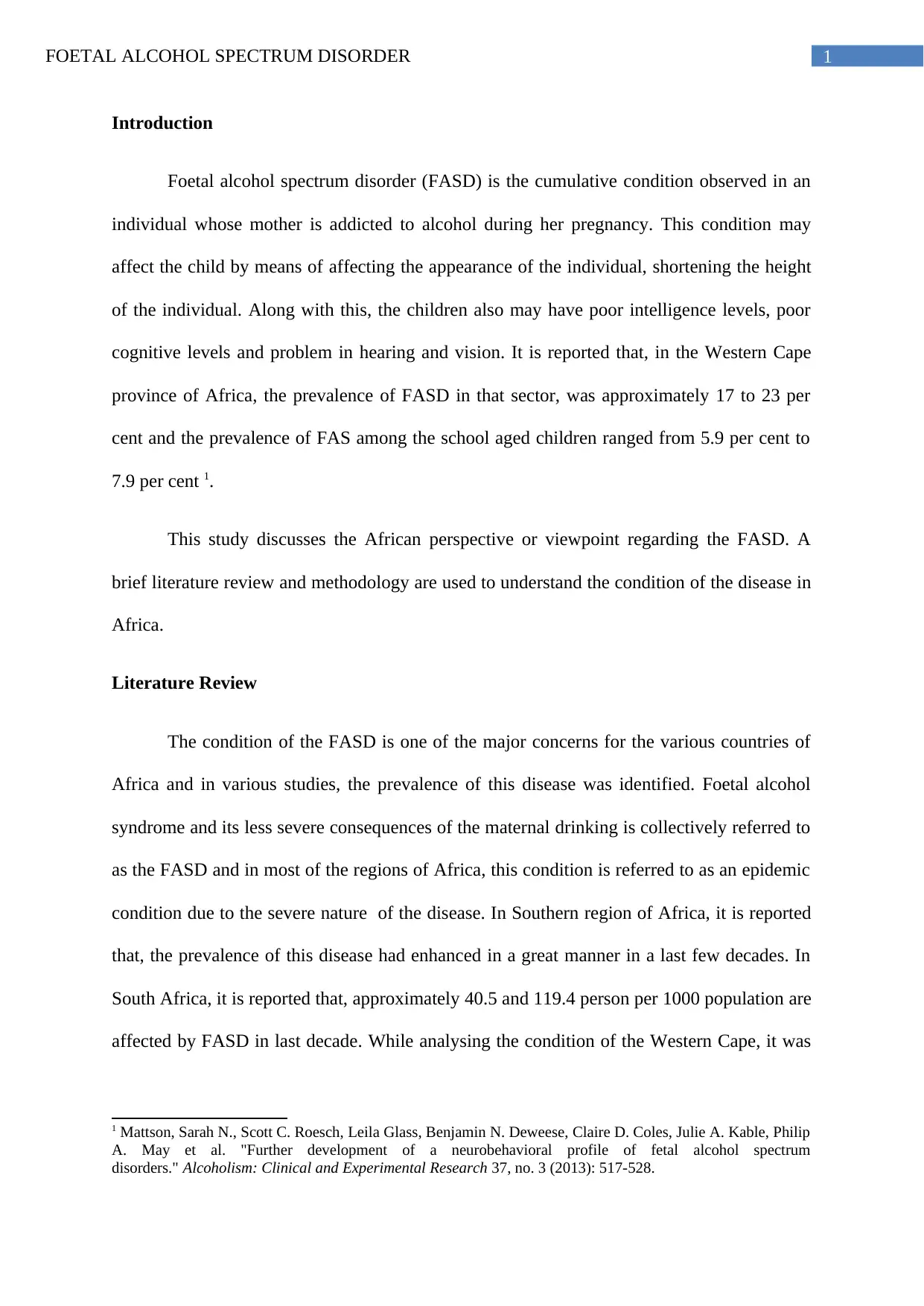
1FOETAL ALCOHOL SPECTRUM DISORDER
Introduction
Foetal alcohol spectrum disorder (FASD) is the cumulative condition observed in an
individual whose mother is addicted to alcohol during her pregnancy. This condition may
affect the child by means of affecting the appearance of the individual, shortening the height
of the individual. Along with this, the children also may have poor intelligence levels, poor
cognitive levels and problem in hearing and vision. It is reported that, in the Western Cape
province of Africa, the prevalence of FASD in that sector, was approximately 17 to 23 per
cent and the prevalence of FAS among the school aged children ranged from 5.9 per cent to
7.9 per cent 1.
This study discusses the African perspective or viewpoint regarding the FASD. A
brief literature review and methodology are used to understand the condition of the disease in
Africa.
Literature Review
The condition of the FASD is one of the major concerns for the various countries of
Africa and in various studies, the prevalence of this disease was identified. Foetal alcohol
syndrome and its less severe consequences of the maternal drinking is collectively referred to
as the FASD and in most of the regions of Africa, this condition is referred to as an epidemic
condition due to the severe nature of the disease. In Southern region of Africa, it is reported
that, the prevalence of this disease had enhanced in a great manner in a last few decades. In
South Africa, it is reported that, approximately 40.5 and 119.4 person per 1000 population are
affected by FASD in last decade. While analysing the condition of the Western Cape, it was
1 Mattson, Sarah N., Scott C. Roesch, Leila Glass, Benjamin N. Deweese, Claire D. Coles, Julie A. Kable, Philip
A. May et al. "Further development of a neurobehavioral profile of fetal alcohol spectrum
disorders." Alcoholism: Clinical and Experimental Research 37, no. 3 (2013): 517-528.
Introduction
Foetal alcohol spectrum disorder (FASD) is the cumulative condition observed in an
individual whose mother is addicted to alcohol during her pregnancy. This condition may
affect the child by means of affecting the appearance of the individual, shortening the height
of the individual. Along with this, the children also may have poor intelligence levels, poor
cognitive levels and problem in hearing and vision. It is reported that, in the Western Cape
province of Africa, the prevalence of FASD in that sector, was approximately 17 to 23 per
cent and the prevalence of FAS among the school aged children ranged from 5.9 per cent to
7.9 per cent 1.
This study discusses the African perspective or viewpoint regarding the FASD. A
brief literature review and methodology are used to understand the condition of the disease in
Africa.
Literature Review
The condition of the FASD is one of the major concerns for the various countries of
Africa and in various studies, the prevalence of this disease was identified. Foetal alcohol
syndrome and its less severe consequences of the maternal drinking is collectively referred to
as the FASD and in most of the regions of Africa, this condition is referred to as an epidemic
condition due to the severe nature of the disease. In Southern region of Africa, it is reported
that, the prevalence of this disease had enhanced in a great manner in a last few decades. In
South Africa, it is reported that, approximately 40.5 and 119.4 person per 1000 population are
affected by FASD in last decade. While analysing the condition of the Western Cape, it was
1 Mattson, Sarah N., Scott C. Roesch, Leila Glass, Benjamin N. Deweese, Claire D. Coles, Julie A. Kable, Philip
A. May et al. "Further development of a neurobehavioral profile of fetal alcohol spectrum
disorders." Alcoholism: Clinical and Experimental Research 37, no. 3 (2013): 517-528.
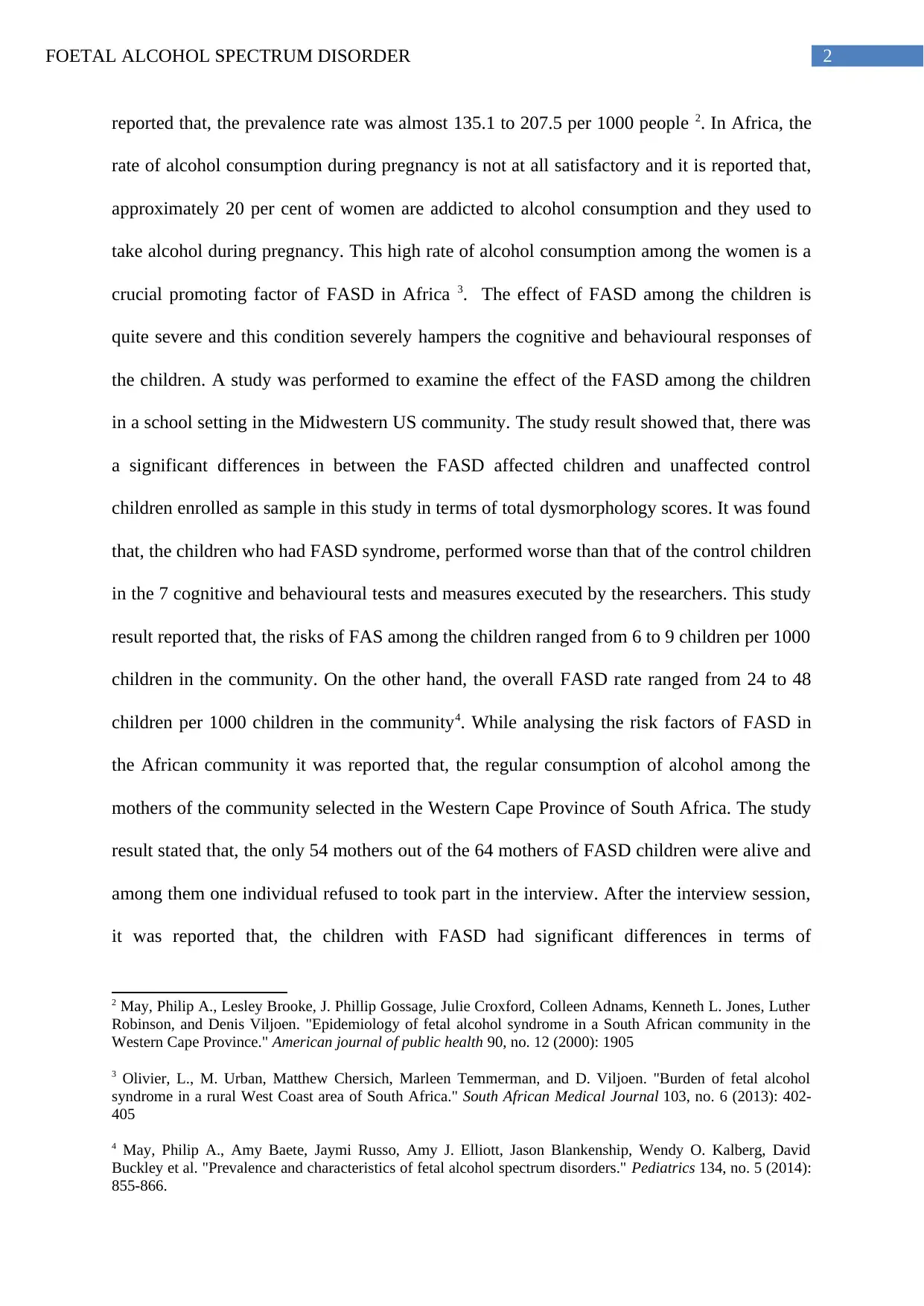
2FOETAL ALCOHOL SPECTRUM DISORDER
reported that, the prevalence rate was almost 135.1 to 207.5 per 1000 people 2. In Africa, the
rate of alcohol consumption during pregnancy is not at all satisfactory and it is reported that,
approximately 20 per cent of women are addicted to alcohol consumption and they used to
take alcohol during pregnancy. This high rate of alcohol consumption among the women is a
crucial promoting factor of FASD in Africa 3. The effect of FASD among the children is
quite severe and this condition severely hampers the cognitive and behavioural responses of
the children. A study was performed to examine the effect of the FASD among the children
in a school setting in the Midwestern US community. The study result showed that, there was
a significant differences in between the FASD affected children and unaffected control
children enrolled as sample in this study in terms of total dysmorphology scores. It was found
that, the children who had FASD syndrome, performed worse than that of the control children
in the 7 cognitive and behavioural tests and measures executed by the researchers. This study
result reported that, the risks of FAS among the children ranged from 6 to 9 children per 1000
children in the community. On the other hand, the overall FASD rate ranged from 24 to 48
children per 1000 children in the community4. While analysing the risk factors of FASD in
the African community it was reported that, the regular consumption of alcohol among the
mothers of the community selected in the Western Cape Province of South Africa. The study
result stated that, the only 54 mothers out of the 64 mothers of FASD children were alive and
among them one individual refused to took part in the interview. After the interview session,
it was reported that, the children with FASD had significant differences in terms of
2 May, Philip A., Lesley Brooke, J. Phillip Gossage, Julie Croxford, Colleen Adnams, Kenneth L. Jones, Luther
Robinson, and Denis Viljoen. "Epidemiology of fetal alcohol syndrome in a South African community in the
Western Cape Province." American journal of public health 90, no. 12 (2000): 1905
3 Olivier, L., M. Urban, Matthew Chersich, Marleen Temmerman, and D. Viljoen. "Burden of fetal alcohol
syndrome in a rural West Coast area of South Africa." South African Medical Journal 103, no. 6 (2013): 402-
405
4 May, Philip A., Amy Baete, Jaymi Russo, Amy J. Elliott, Jason Blankenship, Wendy O. Kalberg, David
Buckley et al. "Prevalence and characteristics of fetal alcohol spectrum disorders." Pediatrics 134, no. 5 (2014):
855-866.
reported that, the prevalence rate was almost 135.1 to 207.5 per 1000 people 2. In Africa, the
rate of alcohol consumption during pregnancy is not at all satisfactory and it is reported that,
approximately 20 per cent of women are addicted to alcohol consumption and they used to
take alcohol during pregnancy. This high rate of alcohol consumption among the women is a
crucial promoting factor of FASD in Africa 3. The effect of FASD among the children is
quite severe and this condition severely hampers the cognitive and behavioural responses of
the children. A study was performed to examine the effect of the FASD among the children
in a school setting in the Midwestern US community. The study result showed that, there was
a significant differences in between the FASD affected children and unaffected control
children enrolled as sample in this study in terms of total dysmorphology scores. It was found
that, the children who had FASD syndrome, performed worse than that of the control children
in the 7 cognitive and behavioural tests and measures executed by the researchers. This study
result reported that, the risks of FAS among the children ranged from 6 to 9 children per 1000
children in the community. On the other hand, the overall FASD rate ranged from 24 to 48
children per 1000 children in the community4. While analysing the risk factors of FASD in
the African community it was reported that, the regular consumption of alcohol among the
mothers of the community selected in the Western Cape Province of South Africa. The study
result stated that, the only 54 mothers out of the 64 mothers of FASD children were alive and
among them one individual refused to took part in the interview. After the interview session,
it was reported that, the children with FASD had significant differences in terms of
2 May, Philip A., Lesley Brooke, J. Phillip Gossage, Julie Croxford, Colleen Adnams, Kenneth L. Jones, Luther
Robinson, and Denis Viljoen. "Epidemiology of fetal alcohol syndrome in a South African community in the
Western Cape Province." American journal of public health 90, no. 12 (2000): 1905
3 Olivier, L., M. Urban, Matthew Chersich, Marleen Temmerman, and D. Viljoen. "Burden of fetal alcohol
syndrome in a rural West Coast area of South Africa." South African Medical Journal 103, no. 6 (2013): 402-
405
4 May, Philip A., Amy Baete, Jaymi Russo, Amy J. Elliott, Jason Blankenship, Wendy O. Kalberg, David
Buckley et al. "Prevalence and characteristics of fetal alcohol spectrum disorders." Pediatrics 134, no. 5 (2014):
855-866.
⊘ This is a preview!⊘
Do you want full access?
Subscribe today to unlock all pages.

Trusted by 1+ million students worldwide
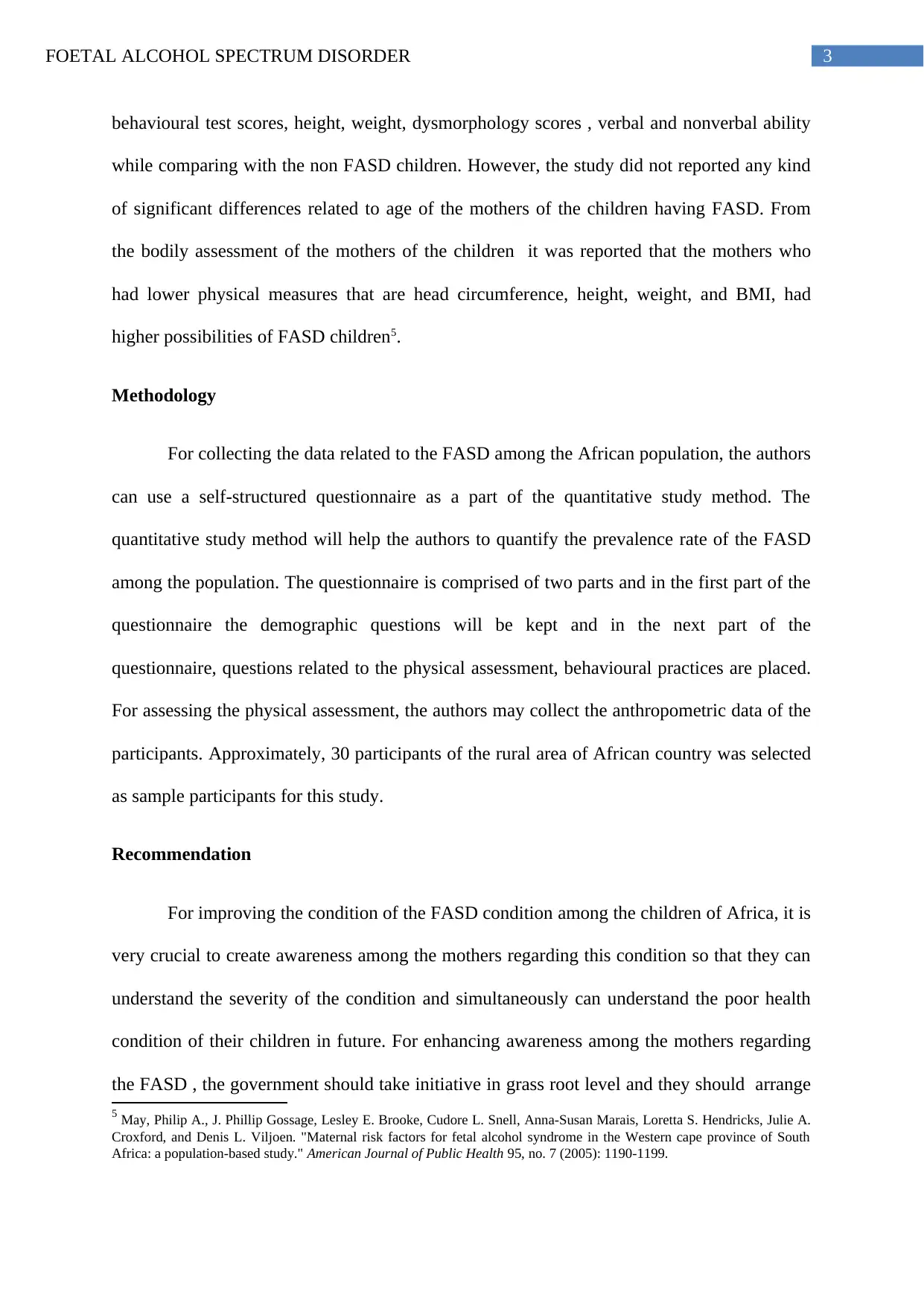
3FOETAL ALCOHOL SPECTRUM DISORDER
behavioural test scores, height, weight, dysmorphology scores , verbal and nonverbal ability
while comparing with the non FASD children. However, the study did not reported any kind
of significant differences related to age of the mothers of the children having FASD. From
the bodily assessment of the mothers of the children it was reported that the mothers who
had lower physical measures that are head circumference, height, weight, and BMI, had
higher possibilities of FASD children5.
Methodology
For collecting the data related to the FASD among the African population, the authors
can use a self-structured questionnaire as a part of the quantitative study method. The
quantitative study method will help the authors to quantify the prevalence rate of the FASD
among the population. The questionnaire is comprised of two parts and in the first part of the
questionnaire the demographic questions will be kept and in the next part of the
questionnaire, questions related to the physical assessment, behavioural practices are placed.
For assessing the physical assessment, the authors may collect the anthropometric data of the
participants. Approximately, 30 participants of the rural area of African country was selected
as sample participants for this study.
Recommendation
For improving the condition of the FASD condition among the children of Africa, it is
very crucial to create awareness among the mothers regarding this condition so that they can
understand the severity of the condition and simultaneously can understand the poor health
condition of their children in future. For enhancing awareness among the mothers regarding
the FASD , the government should take initiative in grass root level and they should arrange
5 May, Philip A., J. Phillip Gossage, Lesley E. Brooke, Cudore L. Snell, Anna-Susan Marais, Loretta S. Hendricks, Julie A.
Croxford, and Denis L. Viljoen. "Maternal risk factors for fetal alcohol syndrome in the Western cape province of South
Africa: a population-based study." American Journal of Public Health 95, no. 7 (2005): 1190-1199.
behavioural test scores, height, weight, dysmorphology scores , verbal and nonverbal ability
while comparing with the non FASD children. However, the study did not reported any kind
of significant differences related to age of the mothers of the children having FASD. From
the bodily assessment of the mothers of the children it was reported that the mothers who
had lower physical measures that are head circumference, height, weight, and BMI, had
higher possibilities of FASD children5.
Methodology
For collecting the data related to the FASD among the African population, the authors
can use a self-structured questionnaire as a part of the quantitative study method. The
quantitative study method will help the authors to quantify the prevalence rate of the FASD
among the population. The questionnaire is comprised of two parts and in the first part of the
questionnaire the demographic questions will be kept and in the next part of the
questionnaire, questions related to the physical assessment, behavioural practices are placed.
For assessing the physical assessment, the authors may collect the anthropometric data of the
participants. Approximately, 30 participants of the rural area of African country was selected
as sample participants for this study.
Recommendation
For improving the condition of the FASD condition among the children of Africa, it is
very crucial to create awareness among the mothers regarding this condition so that they can
understand the severity of the condition and simultaneously can understand the poor health
condition of their children in future. For enhancing awareness among the mothers regarding
the FASD , the government should take initiative in grass root level and they should arrange
5 May, Philip A., J. Phillip Gossage, Lesley E. Brooke, Cudore L. Snell, Anna-Susan Marais, Loretta S. Hendricks, Julie A.
Croxford, and Denis L. Viljoen. "Maternal risk factors for fetal alcohol syndrome in the Western cape province of South
Africa: a population-based study." American Journal of Public Health 95, no. 7 (2005): 1190-1199.
Paraphrase This Document
Need a fresh take? Get an instant paraphrase of this document with our AI Paraphraser
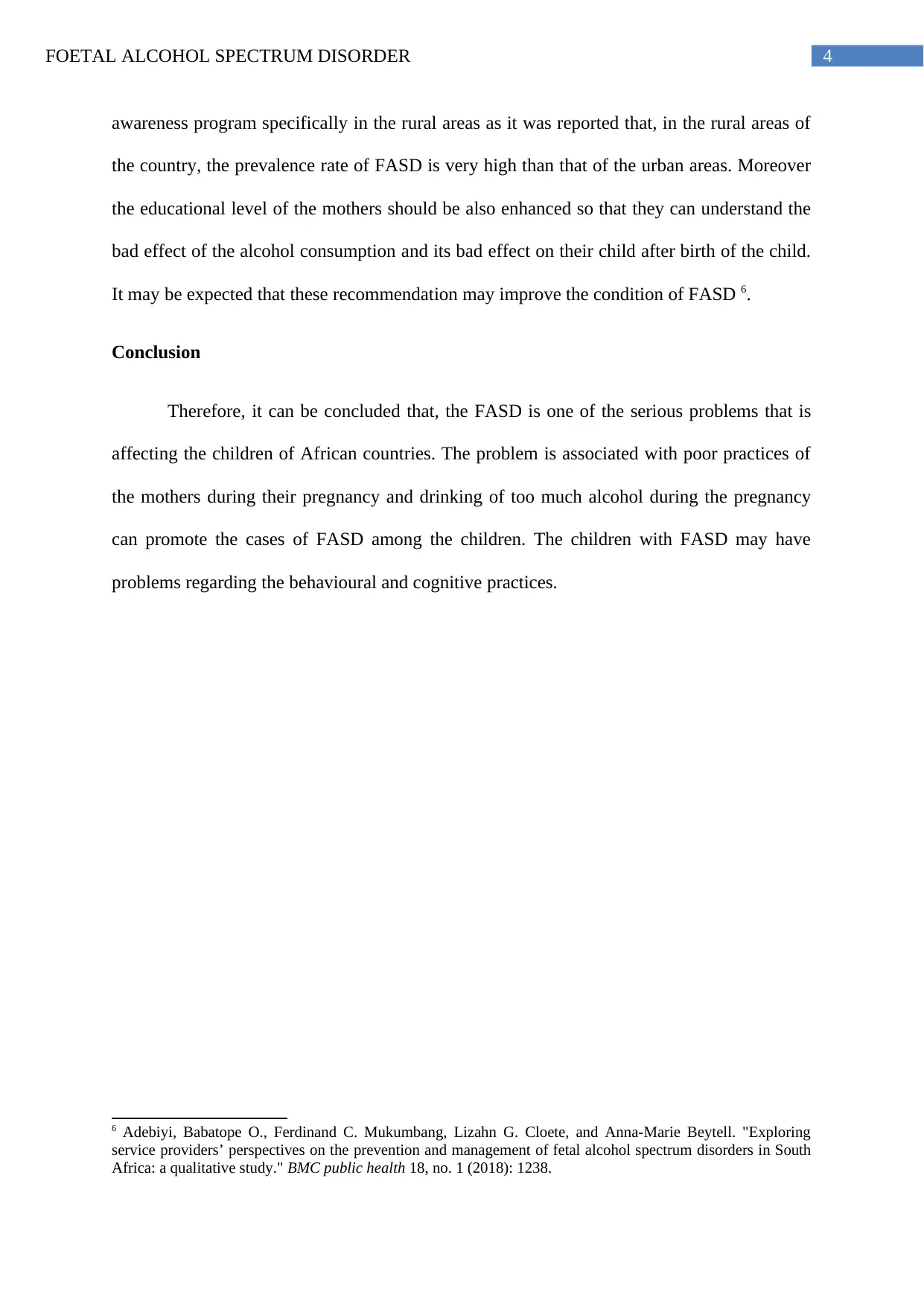
4FOETAL ALCOHOL SPECTRUM DISORDER
awareness program specifically in the rural areas as it was reported that, in the rural areas of
the country, the prevalence rate of FASD is very high than that of the urban areas. Moreover
the educational level of the mothers should be also enhanced so that they can understand the
bad effect of the alcohol consumption and its bad effect on their child after birth of the child.
It may be expected that these recommendation may improve the condition of FASD 6.
Conclusion
Therefore, it can be concluded that, the FASD is one of the serious problems that is
affecting the children of African countries. The problem is associated with poor practices of
the mothers during their pregnancy and drinking of too much alcohol during the pregnancy
can promote the cases of FASD among the children. The children with FASD may have
problems regarding the behavioural and cognitive practices.
6 Adebiyi, Babatope O., Ferdinand C. Mukumbang, Lizahn G. Cloete, and Anna-Marie Beytell. "Exploring
service providers’ perspectives on the prevention and management of fetal alcohol spectrum disorders in South
Africa: a qualitative study." BMC public health 18, no. 1 (2018): 1238.
awareness program specifically in the rural areas as it was reported that, in the rural areas of
the country, the prevalence rate of FASD is very high than that of the urban areas. Moreover
the educational level of the mothers should be also enhanced so that they can understand the
bad effect of the alcohol consumption and its bad effect on their child after birth of the child.
It may be expected that these recommendation may improve the condition of FASD 6.
Conclusion
Therefore, it can be concluded that, the FASD is one of the serious problems that is
affecting the children of African countries. The problem is associated with poor practices of
the mothers during their pregnancy and drinking of too much alcohol during the pregnancy
can promote the cases of FASD among the children. The children with FASD may have
problems regarding the behavioural and cognitive practices.
6 Adebiyi, Babatope O., Ferdinand C. Mukumbang, Lizahn G. Cloete, and Anna-Marie Beytell. "Exploring
service providers’ perspectives on the prevention and management of fetal alcohol spectrum disorders in South
Africa: a qualitative study." BMC public health 18, no. 1 (2018): 1238.
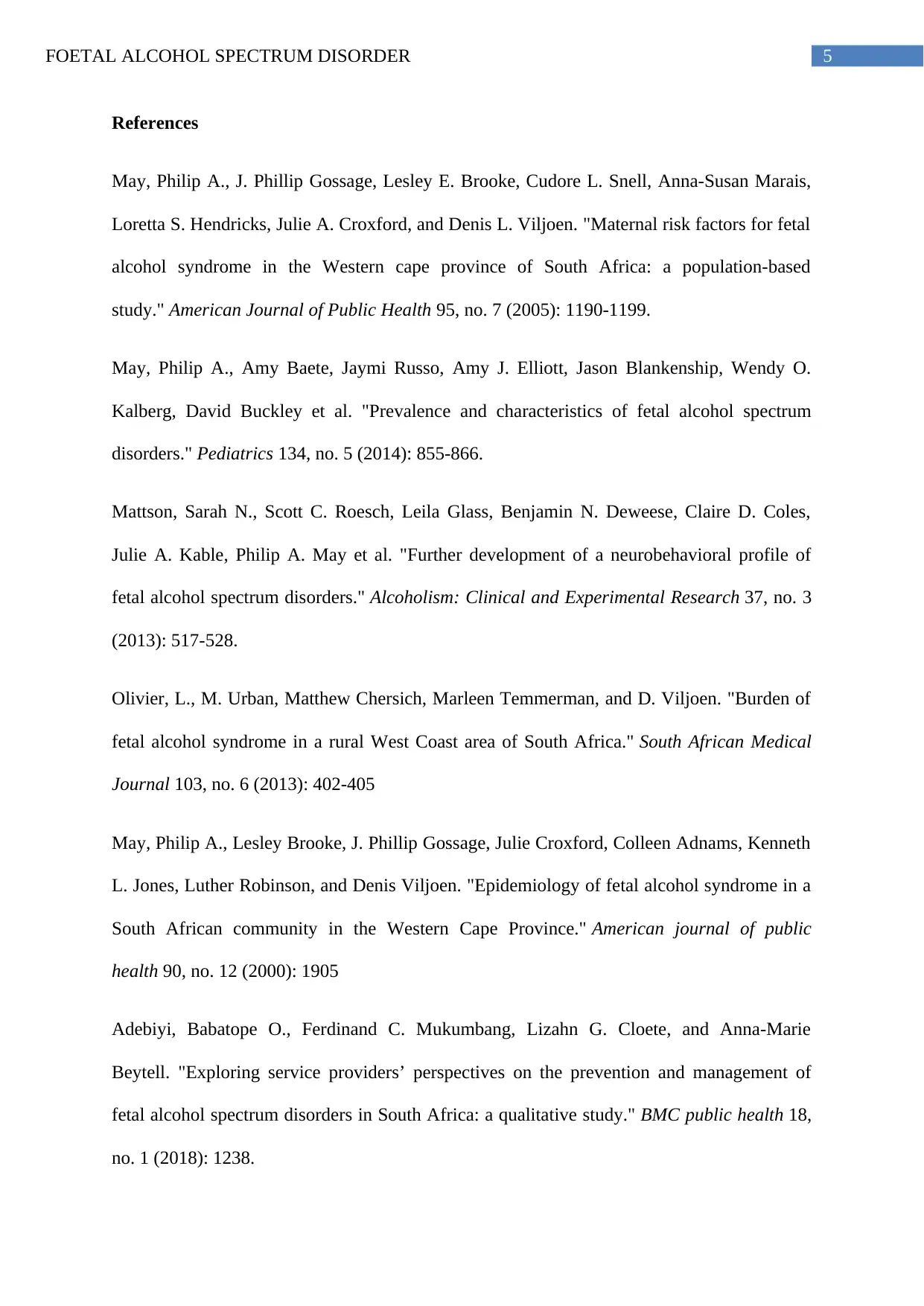
5FOETAL ALCOHOL SPECTRUM DISORDER
References
May, Philip A., J. Phillip Gossage, Lesley E. Brooke, Cudore L. Snell, Anna-Susan Marais,
Loretta S. Hendricks, Julie A. Croxford, and Denis L. Viljoen. "Maternal risk factors for fetal
alcohol syndrome in the Western cape province of South Africa: a population-based
study." American Journal of Public Health 95, no. 7 (2005): 1190-1199.
May, Philip A., Amy Baete, Jaymi Russo, Amy J. Elliott, Jason Blankenship, Wendy O.
Kalberg, David Buckley et al. "Prevalence and characteristics of fetal alcohol spectrum
disorders." Pediatrics 134, no. 5 (2014): 855-866.
Mattson, Sarah N., Scott C. Roesch, Leila Glass, Benjamin N. Deweese, Claire D. Coles,
Julie A. Kable, Philip A. May et al. "Further development of a neurobehavioral profile of
fetal alcohol spectrum disorders." Alcoholism: Clinical and Experimental Research 37, no. 3
(2013): 517-528.
Olivier, L., M. Urban, Matthew Chersich, Marleen Temmerman, and D. Viljoen. "Burden of
fetal alcohol syndrome in a rural West Coast area of South Africa." South African Medical
Journal 103, no. 6 (2013): 402-405
May, Philip A., Lesley Brooke, J. Phillip Gossage, Julie Croxford, Colleen Adnams, Kenneth
L. Jones, Luther Robinson, and Denis Viljoen. "Epidemiology of fetal alcohol syndrome in a
South African community in the Western Cape Province." American journal of public
health 90, no. 12 (2000): 1905
Adebiyi, Babatope O., Ferdinand C. Mukumbang, Lizahn G. Cloete, and Anna-Marie
Beytell. "Exploring service providers’ perspectives on the prevention and management of
fetal alcohol spectrum disorders in South Africa: a qualitative study." BMC public health 18,
no. 1 (2018): 1238.
References
May, Philip A., J. Phillip Gossage, Lesley E. Brooke, Cudore L. Snell, Anna-Susan Marais,
Loretta S. Hendricks, Julie A. Croxford, and Denis L. Viljoen. "Maternal risk factors for fetal
alcohol syndrome in the Western cape province of South Africa: a population-based
study." American Journal of Public Health 95, no. 7 (2005): 1190-1199.
May, Philip A., Amy Baete, Jaymi Russo, Amy J. Elliott, Jason Blankenship, Wendy O.
Kalberg, David Buckley et al. "Prevalence and characteristics of fetal alcohol spectrum
disorders." Pediatrics 134, no. 5 (2014): 855-866.
Mattson, Sarah N., Scott C. Roesch, Leila Glass, Benjamin N. Deweese, Claire D. Coles,
Julie A. Kable, Philip A. May et al. "Further development of a neurobehavioral profile of
fetal alcohol spectrum disorders." Alcoholism: Clinical and Experimental Research 37, no. 3
(2013): 517-528.
Olivier, L., M. Urban, Matthew Chersich, Marleen Temmerman, and D. Viljoen. "Burden of
fetal alcohol syndrome in a rural West Coast area of South Africa." South African Medical
Journal 103, no. 6 (2013): 402-405
May, Philip A., Lesley Brooke, J. Phillip Gossage, Julie Croxford, Colleen Adnams, Kenneth
L. Jones, Luther Robinson, and Denis Viljoen. "Epidemiology of fetal alcohol syndrome in a
South African community in the Western Cape Province." American journal of public
health 90, no. 12 (2000): 1905
Adebiyi, Babatope O., Ferdinand C. Mukumbang, Lizahn G. Cloete, and Anna-Marie
Beytell. "Exploring service providers’ perspectives on the prevention and management of
fetal alcohol spectrum disorders in South Africa: a qualitative study." BMC public health 18,
no. 1 (2018): 1238.
⊘ This is a preview!⊘
Do you want full access?
Subscribe today to unlock all pages.

Trusted by 1+ million students worldwide

6FOETAL ALCOHOL SPECTRUM DISORDER
1 out of 7
Related Documents
Your All-in-One AI-Powered Toolkit for Academic Success.
+13062052269
info@desklib.com
Available 24*7 on WhatsApp / Email
![[object Object]](/_next/static/media/star-bottom.7253800d.svg)
Unlock your academic potential
Copyright © 2020–2025 A2Z Services. All Rights Reserved. Developed and managed by ZUCOL.





